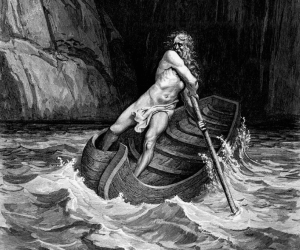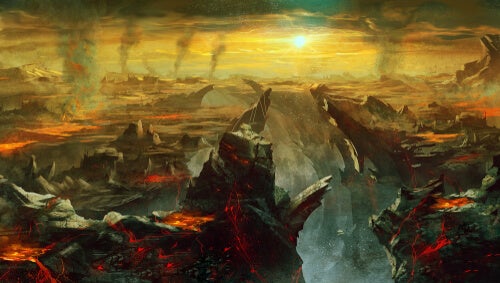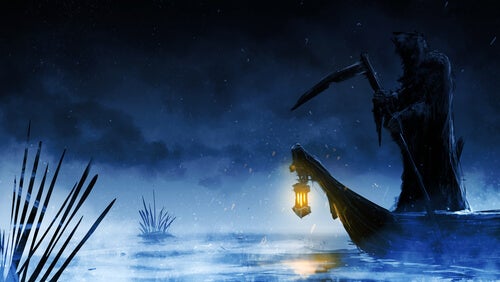The Myth of Charon, Ferryman of the Underworld

The myth of Charon is about one of the most enigmatic characters in Greek mythology: the ferryman of the underworld. His mission was to transport the souls of those who had recently died to Hades, where they would dwell forever.
This character is a ragged and careless old man with a matted white beard. Also, his face is grim, dirty, and gloomy and he has a very nasty attitude. The myth of Charon says that he moved his boat with the help of a pole, that he hoisted the sails, and that his boat was always rusty and nearly dilapidated.
Charon traveled along the Acheron river, which means “River of Pain”. His work was endless and boring, so he had a rather sullen behavior. The only situation that took him out of his infinite routine was when a living person wanted to penetrate the underworld. This actually happened with Hercules and Orpheus. Otherwise, his activity was an eternal repetition of his routine.

The origin of the myth of Charon
The myth of Charon says that the boatman of the underworld was the son of Nyx and Erebus. Also, that he was born in such an ancient time that there was no memory of his birth. For one, Nyx was the goddess of the night, endowed with such overwhelming beauty that even Zeus feared her. In addition, she was the daughter of Chaos and was present in the creation of the universe.
Similarly, Erebus was the god of darkness and shadows. So, he reigned over the deep mists that surrounded the ends of the Earth. In addition, he was present in all underground places. Actually, he was Nyx’s brother and conceived two children with her: Ether, the brightness and luminosity, and Hemera, the day.
According to the myth of Charon, Nyx managed to conceive other children herself without the intervention of her brother and husband Erebus. This is how she had the ferryman’s brothers, who were: Moors, Destiny; Ker, Bane; Thanatos, Death; Hypnos, Dream; Geras, Old Age; Oyzis, Pain; Apate, Deception; Nemesis, deserved punishment; Eris, Discord; Philotes, Tenderness; Momo, Taunt; the Hesperides, Daughters of the Evening; the Oniros, Dreams; the Keres, spirits of destruction and death; and the Moirai, Fatality.
The myth of Charon, the ferryman
The myth of Charon says that the name of this character literally means “intense brightness”. This is because just a second before dying, people have a particular sparkle in their gaze, or so they say. This is alluded to by the name of the ferryman. In fact, one of the common translations is “the one with a wild gaze” or “the one with a fiery gaze”.
Some say that his sisters, the Moirai, called him to fulfill his duty. They invoked him with furious impatience when a person was about to die. It was then that Charon reached the shore and waited for the souls of the recently deceased. However, not all of them could cross the river of pain, or Acheron, with him. Souls needed a coin to pay for their way.
Thus, the Greeks buried their dead with a coin under their tongue. This is because it was the payment for the ferryman to transfer them to Hades. Thus, if the dead didn’t have a coin, or if they had been improperly buried, they would have to wander around the river for a hundred years. (Charon allowed them to cross for free after that time was up).

Charon and Hades
Finally, the myth of Charon says that only two characters were able to get to Hades without dying in the attempt. One of them was Hercules, whom Charon took to the underworld, without knowing very well why and without requesting payment. It was for this reason that the gods punished him and he had to spend a year in jail.
Orpheus was the other mortal who could cross after he enchanted and subdued the ferryman with his magical music. Charon also allowed the goddess Psyche, goddess of the soul, to go through thanks to the tricks she used to confuse him.
Although Charon mainly operated in the Acheron river, he also had the right to navigate other rivers of the underworld, such as Cocytus, the river of lamentation; Phlegeton, the stream of fire; Lete, the river of unmindfulness, and Styx, the river of invulnerability.
All cited sources were thoroughly reviewed by our team to ensure their quality, reliability, currency, and validity. The bibliography of this article was considered reliable and of academic or scientific accuracy.
De Velasco Abellán, F. P. D. (1988). El origen del mito de caronte. Investigacion sobre la idea del paso al mas alla en la atenas clasica (Doctoral dissertation, Universidad Complutense de Madrid).
This text is provided for informational purposes only and does not replace consultation with a professional. If in doubt, consult your specialist.








